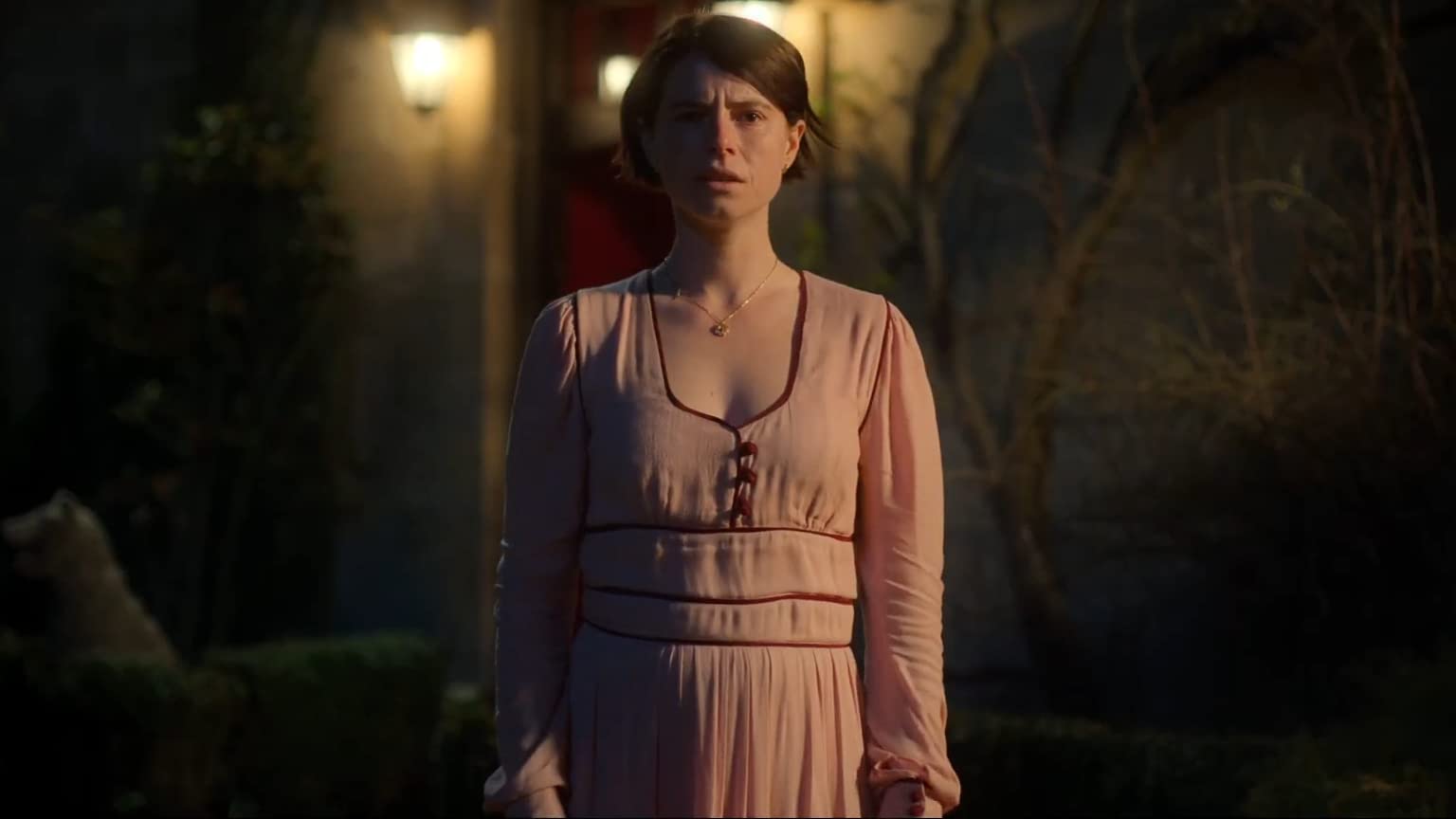Year of Release: 2021
Director: Ben Wheatley
Screenplay: Ben Wheatley
Starring: Joel Fry, Ellora Torchia, Reece Shearsmith, Hayley Squires
Running Time: 107 minutes
Genre: Horror
The world is devastated by a pandemic. In a large forest in England, scientist Martin Lowery (Fry) arrives at a research station, where he is due to investigate crop growth under respected scientist Olivia Wendle (Squires). However, the only way to reach Mandell's camp is an arduous two day trek on foot through the forest. With forest ranger Alma (Torchia) as guide, Martin sets off. Before long it becomes apparent that there is something strange in the forest. Despite it being out of bounds to civilians, they discover the remnants of a family's camp, but the family themselves have vanished. At night, Martin and Alma are attacked by an unseen force that destroys their equipment, and steals their shoes, forcing them to continue barefoot. Martin badly injures his foot, but they are rescued by Zach (Shearsmith), a seemingly friendly man living off the grid in the forest. However Zach has his own reasons for helping them, and they learn that the dark folklore surrounding the forest may be more than just local fairytales, as ancient superstition and modern science collide.
Prolific British filmmaker Ben Wheatley has made a name for himself as one of the most interesting directors working in modern horror. His films remind me a little of the old rhyme about the little girl with the little curl right in the middle of her forehead: when they are good they are very, very good, but when they are bad, they are horrid. Although in Wheatley's case, less horrid and more indulgent and baffling. In the Earth mixes the best and the worst of Wheatley's work. As with several of his films (such as Kill List (2011), Sightseers (2012) and A Field in England (2013)) this could be described as "folk horror", a subgenre of horror films set in rural locations and often dealing with themes such as tradition, religion, isolation and nature, although Wheatley has stated that he dislikes the term. The film is visually spectacular, with beautiful, poetic imagery, and moments of real, genuinely scary, horror, it also is overlong and falls apart into bizarre psychedelic nonsense. Towards the end it becomes completely baffling. Wheatley claims that the film was written and shot within fifteen days during August 2020, in between lockdowns, and it may be one of the first, but it certainly won't be the last, films to deal with COVID-19, although COVID is never actually mentioned in the film, the facemasks, constant handwashing, hand sanitisers and references to "a third wave" and "lockdown" feels all too depressingly familiar in this year of 2021, and will probably make it feel a little dated in a year or two. Joel Fry and Ellora Torchia make engaging, sympathetic leads, although Wheatley never seems particularly interested in his characters, something which I have noticed in several of his films. There is a kind of dark cynicism in Wheatley's work, a sense of humanity being just patsies in a giant, cruel cosmic joke, which may very well be the case, but it makes for a rather miserable experience. It says a lot for Joel Fry and Ellora Torchia that they make their characters as likeable as they are. Reece Shearsmith (The League of Gentlemen (1999-2002), Psychoville (2009-2011) and Inside No. 9 (2014-present)) is perfectly cast and has some fantastic dark comic-horror moments. When Martin and Alma are in his power, and he is chasing after them with a hatchet, those scenes are really scary. The film slows down when Olivia Wendle appears, although Hayley Squires does well with a pretty underwritten part. Both Zach and Olivia are trying to invoke a primal nature spirit, lurking within the forest, Zach by ritual and sacrificial magic, and Olivia with science. The film has it's points to make about science versus magic, and how the divide between the two may not be as definitive as you may think; and the revenge of nature. The nature of what is in the woods is never revealed, and it all ends in a frustratingly obscure fashion. There is a difference between the tantalisingly ambiguous and annoyingly incomprehensible. Frustrating, confusing, slow at times and badly paced, the film has enough frightening and intriguing moments to make it worth watching, and it has some beautiful images and a complex, innovative sound design, which does benefit a lot from being seen on the big screen. There is a vein of dark humour running throughout which is often very funny. It's not full of gore, but there are scenes which even I, a hardened horror film viewer, winced at. A word of warning, if you are at all squeamish about feet, and nasty things happening to said feet, then you will want to proceed with caution. Another note of caution, is that the film features a lot of strobing effects, which may cause problems for some viewers. Ben Wheatley is a very talented filmmaker, and he has a great film in him, but this is not it.

Ellora Torchia and Joel Fry in
In the Earth




